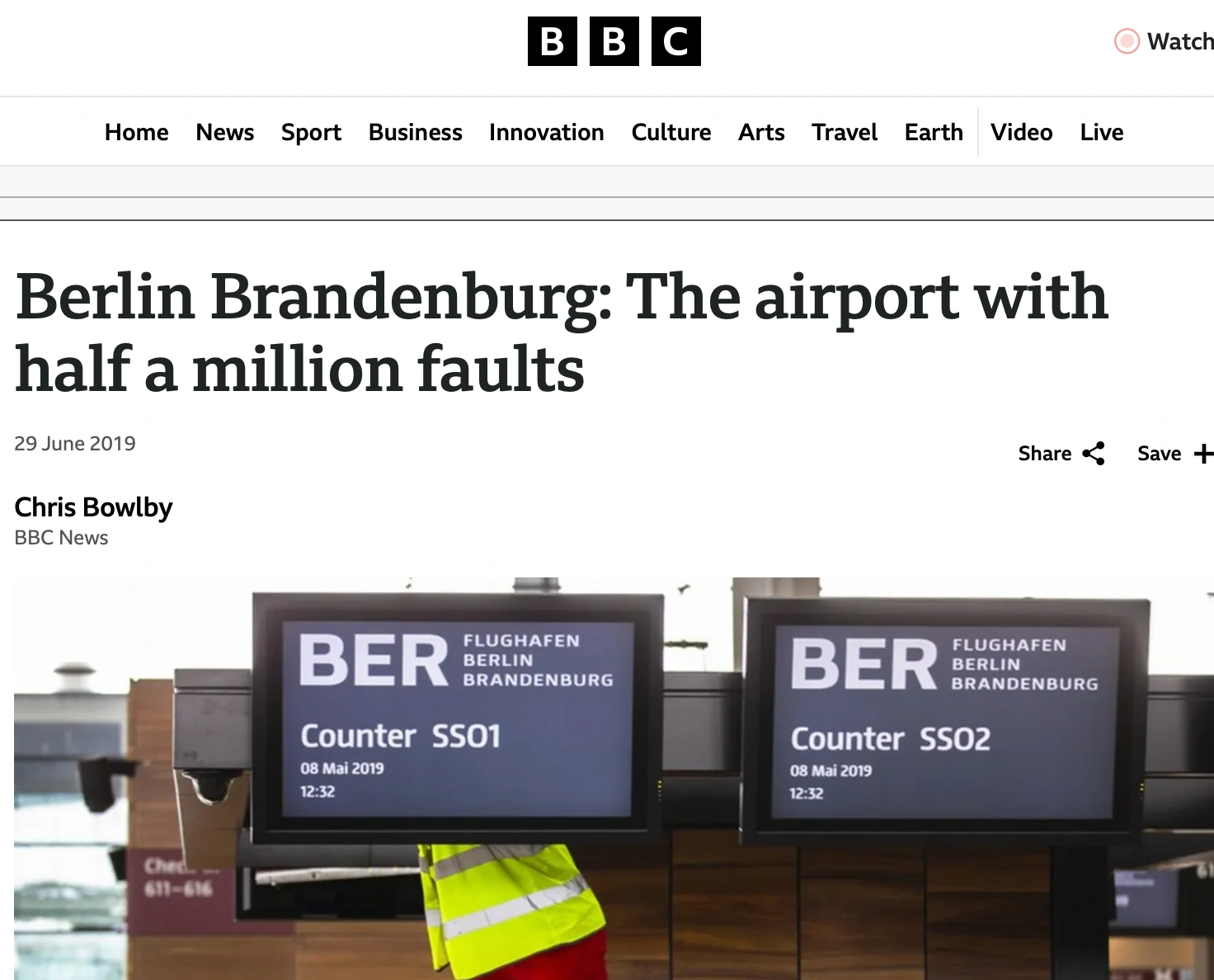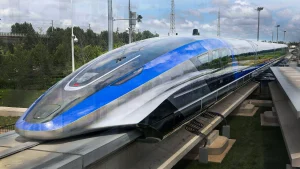Shocked by the Failure of Berlin Airport — What Chinese Think
Berlin Brandenburg Airport was conceived during the Soviet era, with its site chosen in 1992, construction starting in 2006, and eventual operation in 2020. The project endured a series of disasters, including budget miscalculations, funding crises, and airline bankruptcies. It accumulated a staggering 150,000 construction defects, such as smoke exhaust pipes installed under the flooring, mismatched escalator steps, all air vents placed beneath drainage outlets, trees growing on the runway, thousands of unusable lightbulbs, and over 600 firewalls blocking escape routes. Not to mention, there were worker casualties during construction. Despite this chaos, not a single person was held accountable- no one was even fined for the fiasco, let alone sentenced to prison.
These facts have not only shattered the Chinese people’s long-held image of the “meticulously precise Germans,” but some Chinese netizens, in an almost ironic twist, began to find “silver linings” in this debacle.
On the Chinese Quora-equivalent “Zhihu,” the following top-rated comments stand out:
“The Germans are still good at building gas chambers.”
@铃仙优昙华院因幡 (3,359 upvotes):
After watching this, I can only say that the Germans are still best at building gas chambers.
@大袋鼠帝国万岁 (485 upvotes):
As a former civil engineer in Germany, I can say this project exemplifies the German trait of “meticulous documentation for its own sake,” where only the documentation ends up perfect.
@硕翁和洛巴图鲁 (2,547 upvotes):
But in the end, they actually did finish the project! Truly remarkable for a country carrying half the EU on its shoulders—they didn’t completely mess it up!
I even rewatched the video and discovered some bright spots:
project leaders actually resigned midway (repeatedly!). Resignation means Germany’s accountability system is working!
Managers even falsified results during inspections, showing that Germans adhere to a consistent standard when conducting checks.
The fire pipes were cut into 19 sections and embedded in the flooring—this shows Germans really do follow blueprints strictly! Germany isn’t paralyzed; it’s just weak. Compared to other European countries, that’s a monumental achievement!
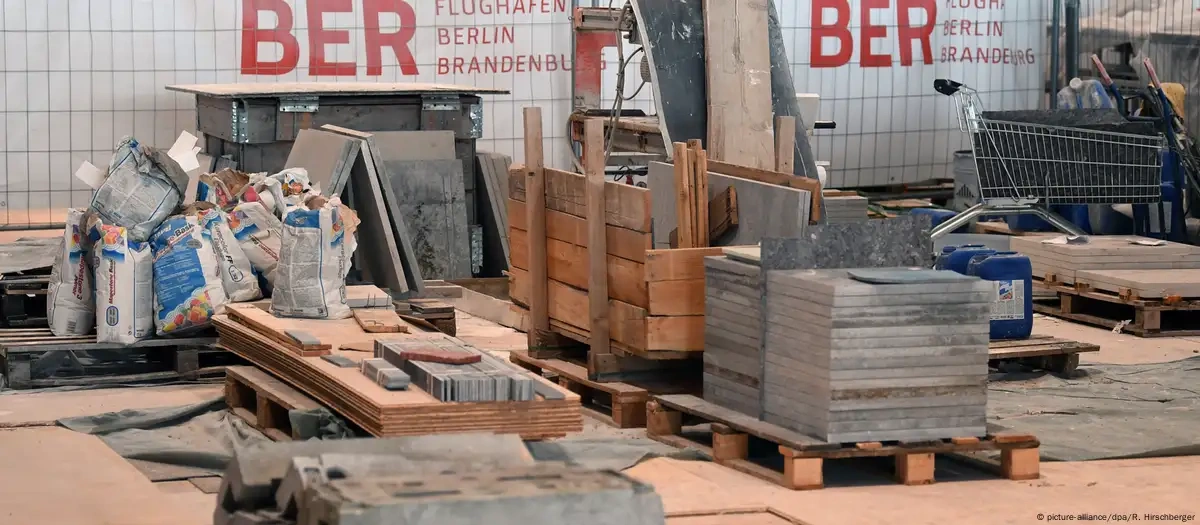 German engineering has become a cliche and they can seemingly build anything on four wheels, but when it comes to four walls it’s a different story, says DW’s Timothy Rooks.
German engineering has become a cliche and they can seemingly build anything on four wheels, but when it comes to four walls it’s a different story, says DW’s Timothy Rooks.
@曹力夫 (1,827 upvotes):
To be fair, this project is still more reliable than Britain’s high-speed rail. At least it was completed in the end. The main problem was chaotic demands from clients and rampant profiteering.
But for the managers of both Berlin Airport and Britain’s high-speed rail projects to shun all responsibility—this is the real “The law does not apply to the nobility.”
(Editor’s note: The “British high-speed rail project” mentioned here refers to HS2, the UK’s High Speed 2 rail project.)
“How did I ever believe the West had no corruption?”
Before the Berlin Brandenburg Airport project, the stereotypical Chinese view of Germans was one of “meticulousness” and “integrity.” The vlog not only prompted the realization that corruption exists in Germany as well, but also that even corruption has its hierarchies:
@跳跳糖 (1,161 upvotes):
How was I ever so unwaveringly convinced that corruption doesn’t exist in the Western world?
@康斯坦丁阿克曼 (2,314 upvotes):
I have to say, though, this airport really is a classic. Corruption, delays, laziness, bureaucracy, and a rigid system—it showcases everything every Chinese person in Germany inevitably encounters, all in one project.
@兮华兮 (99 upvotes):
A PhD student at LMU here. I think this video resonated because of China’s blind worship of industrialized nations, particularly Germany.
In reality, Germany may not be in free fall, but it’s certainly declining day by day. German public infrastructure projects have basically become synonymous with wealth redistribution.
A senior colleague of mine researches this specifically, and in cases where many would be jailed in China, in Germany, they don’t even have to refund the money, let alone face imprisonment.
@语晨 (821 upvotes):
China and the West play by different rules. In China, things are built, bribes are distributed, and the results are tolerable as long as the final product is good.
In Europe, as long as the process is compliant, the outcome doesn’t matter. Brandenburg Airport exemplifies this: everyone operates legally, yet issues persist, and the results are terrible.
@Apokalien (468 upvotes):
“It’s clear that even Europe’s inefficiency varies by degree. At least the old industrial powers on the continent, after spending so much money, actually completed the project.
Regardless of quality, they got it done, and from rework to acceptance took only four years.
Moreover, Germany’s ‘correction mechanisms’ genuinely managed to uncover corrupt officials. Meanwhile, the post-modern financial power of Britain spent roughly the same amount of money but didn’t even move a single brick. What’s more, everyone involved in the project was ‘clean,’ with not a single ‘bad guy’ identified.”
@lvis30901 (3,498 upvotes):
“China’s criticized engineering projects are mostly about having questionable goals, not flawed execution. Take, for example, the infamous Shui Si Lou or the giant Guan Yu statue. Can we question the purpose? Absolutely. After all, why would a county build something like a world wonder? But the actual structures did get built.
 The picture shows the “Shuisi Tower” in Dushan County, Guizhou Province, China, which has now been converted into a hotel.
The picture shows the “Shuisi Tower” in Dushan County, Guizhou Province, China, which has now been converted into a hotel.
That Guan Yu statue—was it worth that money? Well, for such a massive statue, spending one or two hundred million yuan seems reasonable to me. And honestly, it’s beautifully sculpted—I’d give it a 95 out of 100. At the very least, it’s better looking than the Statue of Liberty.
 The Guan Yu statue cost 170 million RMB
The Guan Yu statue cost 170 million RMB
But the West takes inefficiency to a whole new level. Their projects have perfectly valid purposes, and not just valid—they’re often essential.
Yet, these essential projects turn into global embarrassments, costing billions while yielding nothing or getting abandoned midway.”
(Editor’s Note: The Shui Si Lou cost over 200 million RMB, and the Guan Yu statue cost 170 million RMB. These are infamous “vanity projects” in China—large landmark buildings constructed by local officials seeking visual impact to boost tourism revenue and political achievements, but often with poor results. Such projects are widely regarded as symbols of corruption in China.)
@天燕九零 (719 upvotes)
“After Shinzo Abe’s Moritomo Gakuen scandal—where a plot of land in Osaka worth 1 billion yen was sold for just 2 million yen—at least someone in accounting jumped off a building in shame.
A Ministry of Finance official even left a suicide note taking responsibility. And yet Germany managed to land this smoothly? Germany must be kinder to its accountants.”
Reevaluating Chinese Construction
The shock of Berlin Brandenburg Airport has even made some Chinese netizens reevaluate their often-criticized domestic infrastructure projects more favorably:
@c126yz (3,144 upvotes):
As someone familiar with civil aviation and airport projects, I was dumbfounded. Berlin Airport cost €7 billion over 30 years for a planned capacity of 35 million passengers. In comparison, my company’s third-phase expansion cost RMB 28 billion over 7–8 years and achieved a capacity of 40 million passengers.
@王盛 (793 upvotes):
Using Chengdu Tianfu Airport, which I’ve criticized for years, as a comparison to Berlin Brandenburg Airport: socialism indeed has lessons worth learning.
• In 1996, the Berlin Brandenburg International Airport project was approved.
• On October 31, 2020, Terminal 1 of the Berlin Brandenburg Airport was put into operation.
• On March 24, 2022, Terminal 2 of the Berlin Brandenburg Airport was put into operation.
This took a total of 26 years, costing €8 billion (approximately RMB 63 billion), with 130 aircraft stands. In 2023, its passenger throughput reached 23 million.
• In January 2015, Chengdu’s new airport project received approval.
• On May 7, 2016, construction of Chengdu Tianfu International Airport officially began.
• This took a total of 6 years, costing RMB 71.2 billion, with 210 aircraft stands. In 2023, its passenger throughput reached 44.786 million.
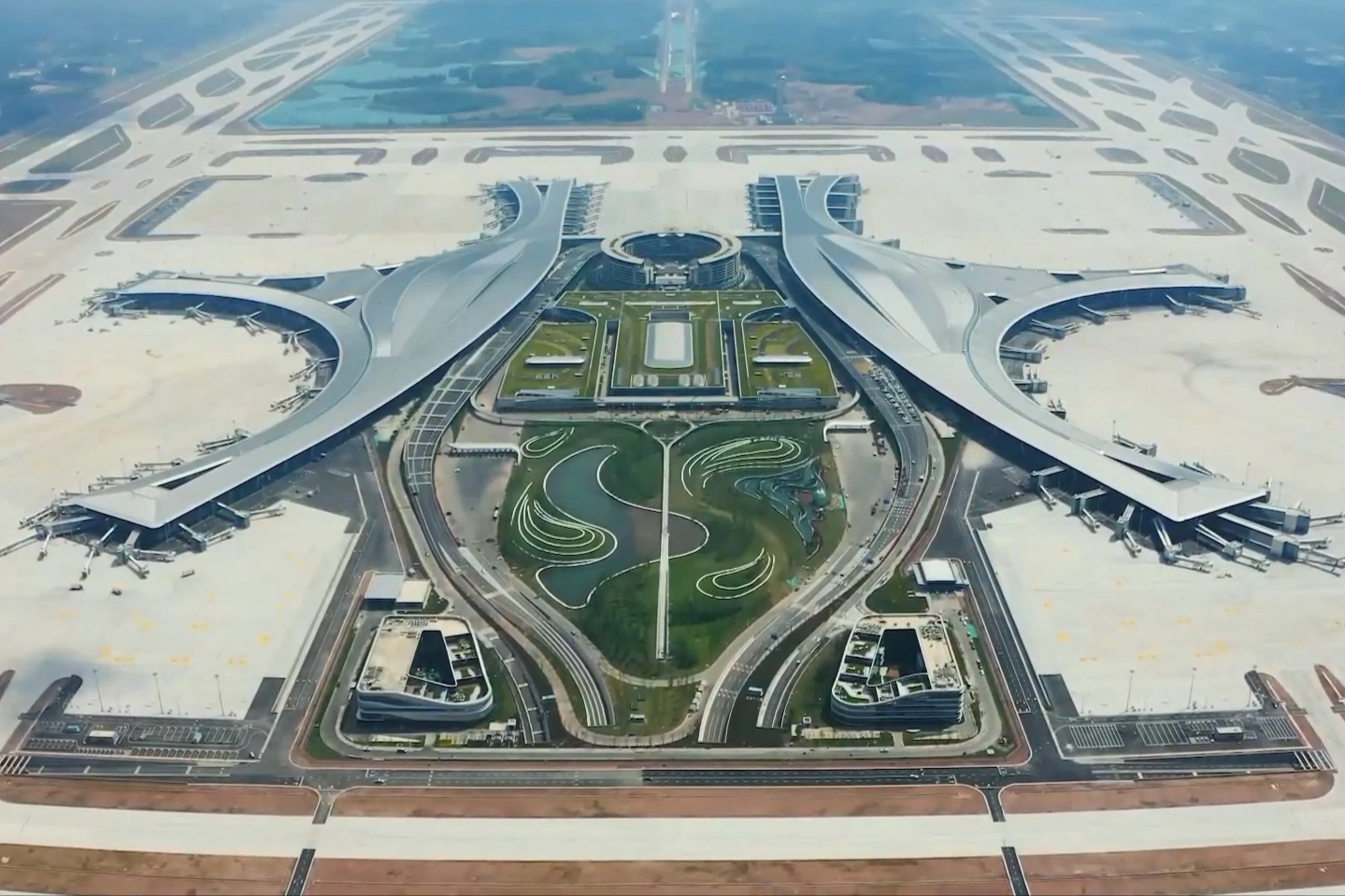 Chengdu Tianfu Airport began construction in May 2016 and commenced operation on June 27, 2021. It is designed to meet the demand for an annual passenger throughput of 60 million and a cargo/mail […]
Chengdu Tianfu Airport began construction in May 2016 and commenced operation on June 27, 2021. It is designed to meet the demand for an annual passenger throughput of 60 million and a cargo/mail […]
Even More Shocking Examples of Europe’s Incomplete Projects
When evaluating the Brandenburg Airport, apart from comments about China’s efficiency or Germany’s “advantages,” some netizens shared their own observations from personal experience:
@li li (512 likes):
As a Chinese engineer working in Germany:
A colleague of mine was responsible for adding a zebra crossing to a two-lane road near our company. It cost several hundred thousand euros.
Why was the zebra crossing so expensive? Upon inquiry, I learned the following:
Initially, the municipal department wanted to avoid disrupting ground traffic and keep the roads smooth. So, they first proposed an underground passage. Feasibility studies and designs took 2-3 years, but the plan was ultimately scrapped due to high costs.
Then they switched to designing an overpass. Another round of feasibility studies and designs took another 2-3 years, only for the plan to be rejected again.
By the time these delays had passed, inflation caused the original budget to become insufficient.
In the end, all they did was paint a zebra crossing on the road.
My colleague was the engineer who initially worked on the underground passage design. He spent half a year on it and received several months of salary. I’ve been working here for 6-7 years, handling at least 20 projects, but only two of them have been completed and put into operation. This is the current state of Germany’s infrastructure.
@三体驻地球办事处 (74 likes):
The Elbphilharmonie in Hamburg:
• Initiated in 2005, originally planned to open in 2010 with a budget of €77 million.
• By 2013, costs were announced to have risen to €789 million, and it finally opened in 2017.
• At that time, the Mayor of Hamburg was Olaf Scholz.
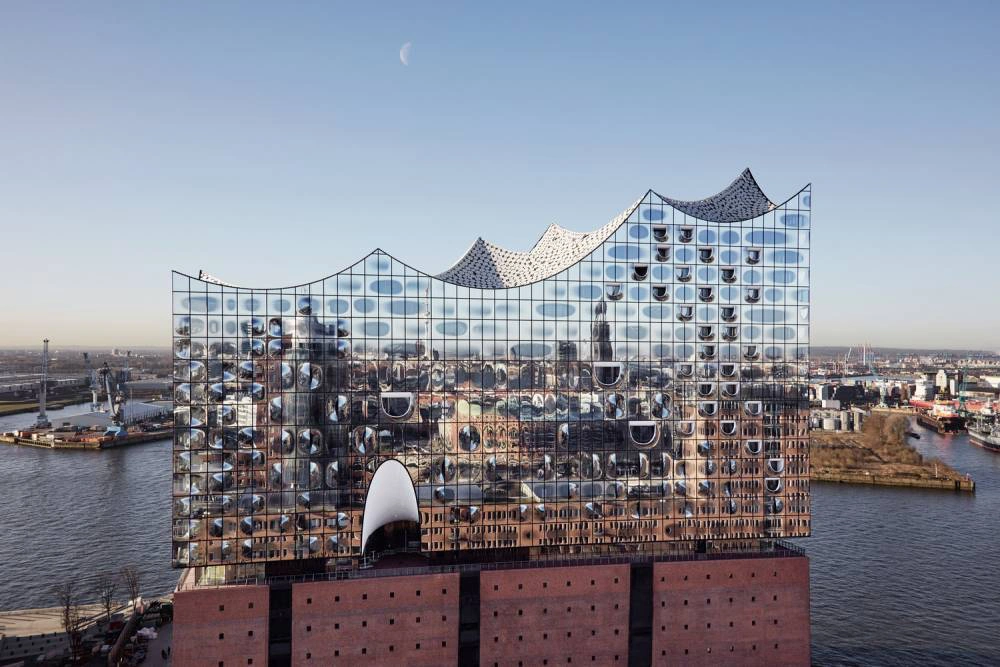 The Elbphilharmonie’s construction, with costs soaring far beyond the original budget and multiple delays, became a scandal. Initially estimated at 77 million euros from the City of Hamburg, the final cost reached nearly 800 million euros by the end of 2016.
The Elbphilharmonie’s construction, with costs soaring far beyond the original budget and multiple delays, became a scandal. Initially estimated at 77 million euros from the City of Hamburg, the final cost reached nearly 800 million euros by the end of 2016.
The Flakturm air raid tower renovation in Hamburg:
• Overspent by €35 million compared to the original budget.
• Even now, only part of it has been completed, and future additional investment is inevitable.
• It is widely recognized by Hamburg’s real estate industry as a “garbage project.”
The Elbe Tunnel Renovation in Hamburg:
• Originally budgeted at €20 million, it ultimately cost €70 million and was delayed by 8 years.
@DAS VOLK (49 likes):
In the neighboring state, the Stuttgart 21 railway station renovation project (Stuttgart Hauptbahnhof S21) has been ongoing for decades:
• Initial planning began in the early 1990s.
• Construction started in 2010.
• As of 2024, it is still unfinished, though it may be completed in a few more years.
Due to the renovation, passengers have to walk a very long temporary corridor to reach the platforms—more than a kilometer apart from the main station building.
While browsing German expat forums, I often see people lamenting how the Stuttgart station renovation began when they arrived in Germany and was still unfinished by the time they left.
 An image of the Stuttgart railway station under construction. On the left is the long pedestrian bridge connecting to the platforms.
An image of the Stuttgart railway station under construction. On the left is the long pedestrian bridge connecting to the platforms.
@宁中则:(471 likes):
Here are just a few examples of outrageous infrastructure projects in the U.S.:
• A $7 billion New York subway handrail project.
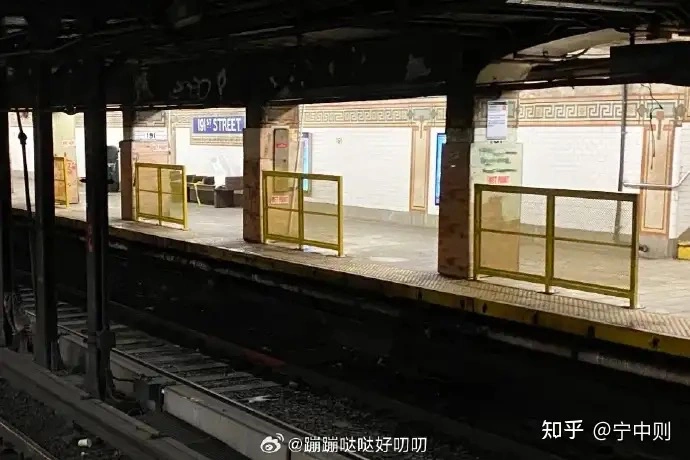
• A $1.1 billion, 9-year project to build a 487-meter high-speed rail bridge—only to cancel the high-speed rail itself afterward.
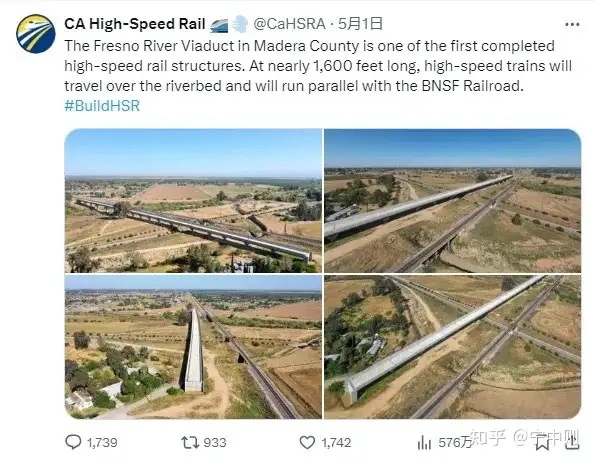
• Boston’s famous “Big Dig” project: a $22 billion, 15-year river tunnel that leaks water and has tiles falling off constantly.
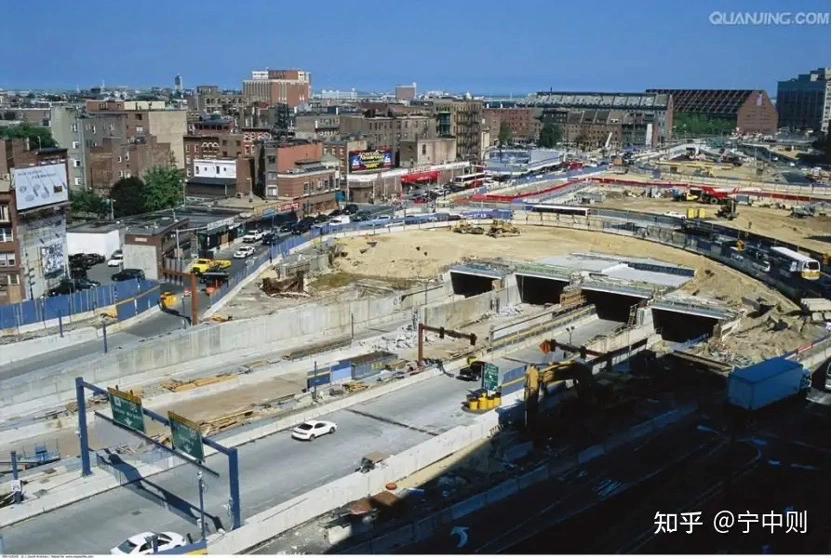
• A $14.2 million pedestrian overpass that collapsed a few days after completion, killing 10 people.
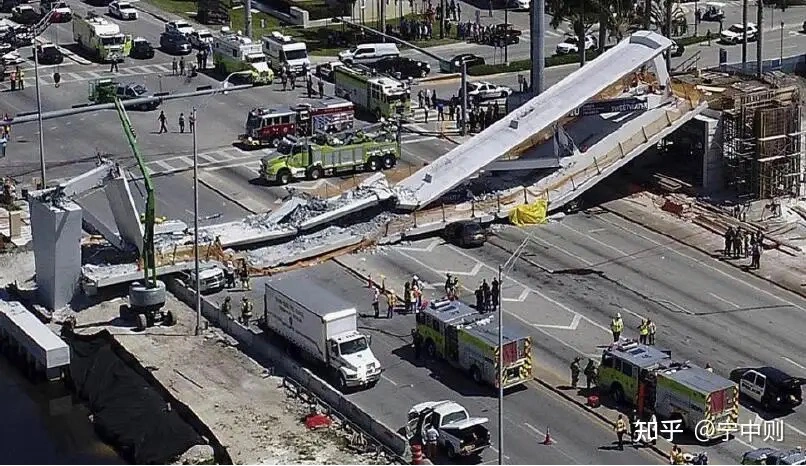
• The launch tower for the SLS rocket,Its budget ballooned from $383 million to $2.7 billion. The completion date was pushed back to 2029.
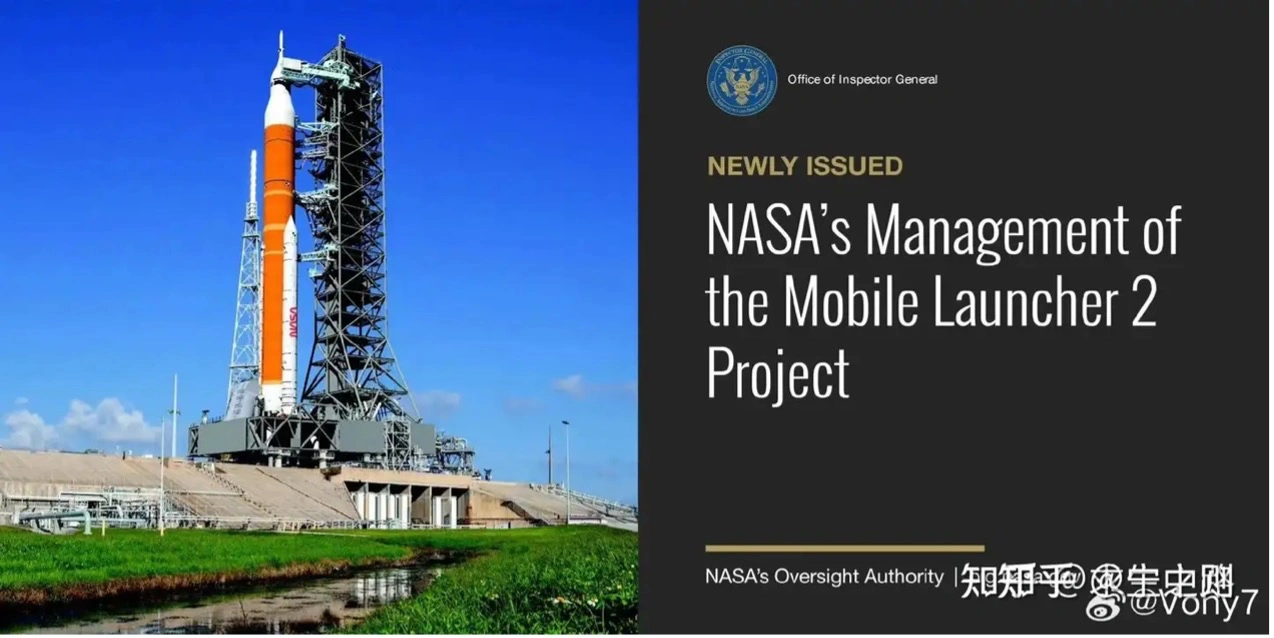
@祈祈(103 likes)
• Hans: “See that airport over there? That’s how I got my villa.”
• A few years later, Hans visits his friend Johann’s home.
• John: “See the HS2 high-speed rail project out there? That’s how I got my villa.”
• Hans: “But there’s no railway out there!”
• John: “Exactly.”
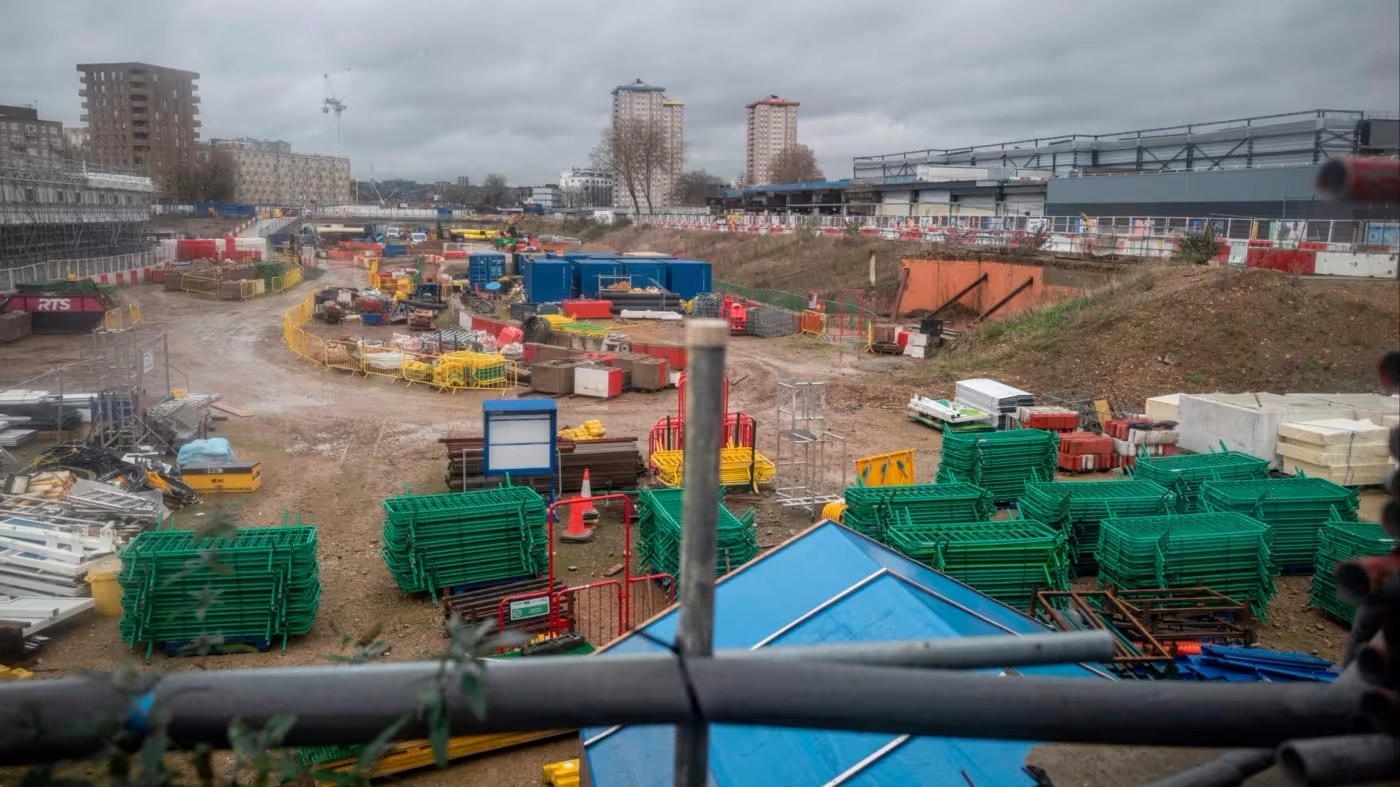 The latest estimate highlights how the cost of Britain’s flagship transport project appears to be out of control © Charlie Bibby/FT
The latest estimate highlights how the cost of Britain’s flagship transport project appears to be out of control © Charlie Bibby/FT
【Editor’s Note: The repeatedly mentioned UK high-speed rail project refers to High Speed 2 (HS2), a government-approved project in January 2012. The initial phase was projected to cost £32 billion, with the entire line planned for operation by 2033.
Over the past 20+ years and six prime ministers, the UK government’s official estimate last year ranged from £49bn to £57bn, made after slashing the northern HS2 leg from Birmingham to Manchester to save money. However, the Financial Times now reports that the cost has risen to £66bn, a £9bn increase. Even so, the earliest completion date for service is 2029.】
Conclusion:
Instead of ending with Chinese netizens’ commentary, let’s conclude with a lament from someone truly affected by these “tofu-dreg” projects, a phrase in Chinese used to describe projects whose durability is even dwarfed by Tofu.
In September 2023, former UK Prime Minister Boris Johnson wrote in his Daily Mail column about the HS2 project:
“In the universities of Beijing, they teach a course in political science where they — as you might expect — focus on the disadvantages of democracy. To prove to their eager communist students that democratically elected politicians are chronically incapable of making decisions for the national interest, Chinese professors cite a case study from the UK: HS2.
In the time since both the UK and China launched new high-speed rail programs, China has built 25,000 miles of high-speed railway, while we have built zero completed miles. As for costs, ‘the comparison would be almost too painful to describe.’”
In the September when Boris wrote this article, the HS2 railway project, in an effort to reduce costs, was discussing cutting the northern Birmingham-Manchester line. He wrote with a sense of powerlessness, saying, “I howled with frustration. It was more of a groan, a long, low despairing groan.”
However, the former prime minister’s lament proved futile. Shortly afterward, the plan to shorten the railway was still carried out.
The aforementioned extravagantly wasteful projects clearly failed to stir more action—or even a sense of shame—in the Western world.


